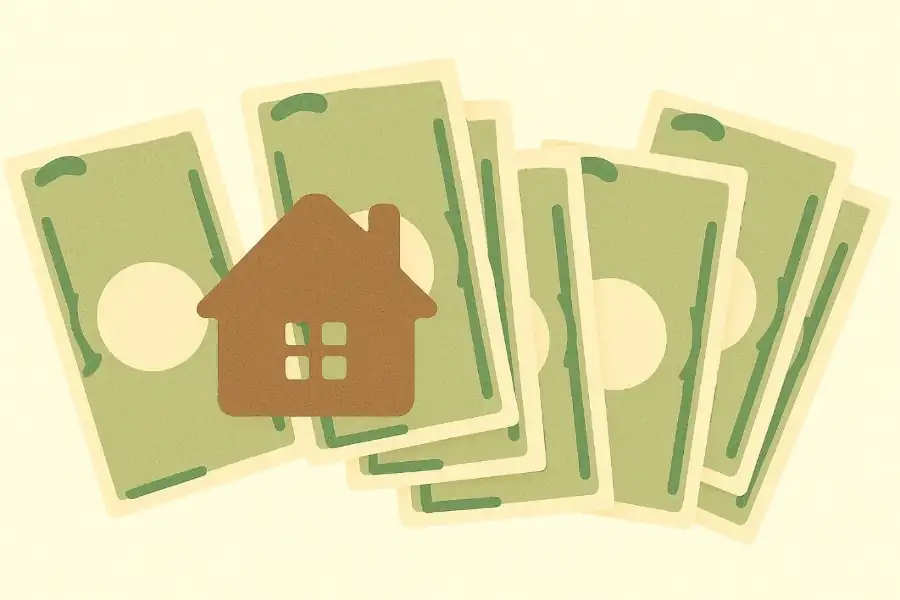In Japan’s rental housing market, rent increases continue due to rising construction material and labor costs, as well as higher repair and maintenance fees. However, landlords cannot raise rent freely. Rent increases must comply with the provisions of Article 32 of the Act on Land and Building Leases.
This article explains how rent is determined in Japan, the legal basis for rent increases, differences between standard and fixed-term lease contracts, negotiation methods, and recent trends in the rental market.
Note: The information below provides general guidance on Japan’s rental system. Policies and procedures may differ by property or contract. This is not legal advice; for individual situations, we recommend consulting a professional or local consultation service.
How rent is determined in Japan

Rent is determined by considering factors such as:
- Property structure (wooden, steel-frame, reinforced concrete, etc.)
- Age of the building
- Location
- Floor plan and size
- Amenities and features
- Market rates in the surrounding area
In terms of structure, reinforced concrete apartment buildings tend to have higher rent than wooden apartments due to better soundproofing and earthquake resistance. Rent also fluctuates based on building age, distance to the station, access to city centers, and whether there are convenient facilities like commercial establishments or schools nearby.
Furthermore, the level of amenities such as auto-lock systems, delivery boxes, and parking availability also affects rent. After comprehensively considering various factors, the property owner (landlord) typically sets the rent.
When and why landlords can raise the rent

Landlords can only raise rent when there are legally justified reasons, not at their own discretion. For example, they can request a rent review if “taxes or maintenance costs have increased,” “prices have fluctuated,” or “the rent is unreasonably low (or high) compared to surrounding market rates.”
According to Article 32 of the Act on Land and Building Leases:
“When the rent for a building becomes inappropriate due to increases or decreases in taxes or other burdens on the land or building, rises or falls in the price of the land or building or other changes in economic conditions, or in comparison to rent of similar buildings in the vicinity, either party may, regardless of the contract terms, request an increase or decrease in the rent for the building in the future. However, if there is a special agreement that the rent for the building shall not be increased for a certain period, that provision shall be followed.”
Rent increases may be considered when taxes like property tax or repair and management costs rise, maintenance costs increase due to higher material or labor expenses, costs rise due to inflation, or when overall market rates in the surrounding area increase and the current rent is below market value.
On the other hand, cases like “the landlord wants to increase personal income,” “because the tenant has lived there a long time,” or “just wanting to raise rent” do not constitute legally valid changes in circumstances and are not permitted.
For more info, check out our blog: What Makes an Apartment More Expensive?
Fixed-term vs. ordinary leases: Key differences

In a standard lease contract, as long as the tenant wishes to continue, the contract can be renewed unless the landlord has just cause to refuse. Meanwhile, fixed-term lease contracts are premised on ending when the contract period expires, do not allow automatic renewal, and require mutual agreement between landlord and tenant for renewal.
Additionally, standard lease contracts generally recognize the right to request rent increases or decreases. Renewal fees apply if stipulated in the contract, but the key feature is that this contract type is renewable.
In contrast, fixed-term lease contracts have no renewal after the contract period ends, so renewal fees typically only appear as part of a new contract after the original contract ends. Rent revisions may also be restricted by special clauses.
When choosing between contract types, consider factors like “how long you plan to live there” and “whether you want the option to renew the contract.”
| Standard Lease Contract | Fixed-Term Lease Contract | |
| Contract Method | Oral or written | Written (e.g., notarized documents) |
| Contract Renewal | Renewed unless there’s just cause not to | No automatic renewal upon contract expiration (renewal possible) |
| Rent Increases/Decreases | Can be requested regardless of special clauses | Follow the provisions of the special clauses |
| Tenant’s Mid-Term Cancellation | If there’s a special clause regarding mid-term cancellation, follow those provisions | For residential properties under 200㎡, tenants may cancel mid-contract if unavoidable circumstances are recognized. However, if there’s a special clause regarding mid-term cancellation in the contract, those provisions apply |
Source: Ministry of Land, Infrastructure, Transport and Tourism – Fixed-Term Lease System
For more info, check out our blog: Guide to the Apartment Lease Signing Process
How the rent revision process works in practice

First, the landlord or management company negotiates directly with the tenant regarding the rent revision. At that time, it’s standard practice to clarify the reasons for revision and send the request document to the tenant using certified mail. If the tenant reviews the content and agrees, the revision details are documented in writing, such as a memorandum, thereby completing the procedure.
Rent increase notice requirements in Japan (what must be included)

When you receive a rent increase notice from your landlord or management company, it’s important to first review the notice’s contents. The notice should include information such as:
- The property name, address, and other contract details
- The notice date and the effective date when the increase begins
- Current rent and new rent (or the amount of increase)
- Reason for the increase (rising neighborhood rates, increased property taxes or maintenance costs, etc.)
- Name and contact information of the landlord or management company
If there are unclear points like “no amount written,” “unclear when it takes effect,” or “no explanation of reasons,” check with the landlord. Be careful, as agreeing while the content is unclear could lead to problems later.
After receiving the notice, verify whether the reasons justifying the revision are appropriate. For example, check whether there’s a reasonable explanation like “rent is lower than similar properties nearby.” If you’re not convinced, communicate in writing or by email that you’re “requesting an explanation of the reasons provided” or “cannot agree to the revision.”
One-sided rent increases are not legally permitted, so under Article 32 of the Act on Land and Building Leases, you have no obligation to comply without “just cause.” Continue discussions while paying rent, and if you’re concerned, consult with your municipality’s free consultation service or a lawyer.
What tenants can do if they disagree with a rent increase

If you cannot accept the rent increase, there’s ultimately a method to seek resolution through court mediation or litigation. In that case, you’ll need to prepare materials that demonstrate “whether the current rent is appropriate,” such as:
- Survey reports or opinions from real estate companies summarizing the rents of similar nearby properties
- Detailed investigation reports (appraisal reports) from real estate appraisers
Real estate company surveys are requested from local businesses. They compile lists of rents for properties with similar conditions in the same area, used to objectively confirm market rates.
Real estate appraiser investigation reports (appraisal reports) are comprehensive judgments by specialists who examine the property, assessing the building’s condition, location, and surrounding market conditions to report the appropriate price.
Since these materials are accepted as evidence in court, it’s good to prepare documentation when resolution through discussion seems difficult.
Recent market trends in rent increases in Japan

According to the Ministry of Internal Affairs and Communications’ “2023 Housing and Land Survey,” rent for rental housing (residential use) in Japan averages approximately ¥59,656 per month nationwide, a 7.1% increase compared to 2018.
Public housing (operated by prefectures or municipalities) averages ¥24,961 monthly, up 7.6% from five years ago. UR (Urban Renaissance Agency) and public corporation housing is ¥71,831, with only a 2.8% increase.
Meanwhile, in private rental housing common in the general rental market, wooden structures are ¥54,409 (4.5% increase), and non-wooden structures are ¥68,548 (7.0% increase). This indicates that rents for sturdier buildings such as condominiums and reinforced structures are rising more noticeably.
This is due to rising construction costs, repair expenses, inflation, and labor costs. Additionally, especially in urban areas, demand for “quality housing” is growing, with rents tending to increase for properties with enhanced amenities like auto-lock and delivery boxes. Looking at rent per tatami mat, the national average is ¥3,403. Privately rented non-wooden units have the highest rate at ¥4,151, followed by “UR (Urban Renaissance Agency) / public housing” at ¥3,633. These figures clearly show that sturdier, non-wooden structures such as condominium-style buildings tend to command higher rent per unit of space.
Source: Ministry of Internal Affairs and Communications | 2023 Housing and Land Survey
Practical tips to protect yourself from unfair rent hikes

Point 1: Verify the supporting materials for the rent increase
When asked for a rent increase, first confirm what data the landlord based their request on.
Point 2: Discuss without getting emotional
A rent increase might be surprising. However, becoming emotional makes negotiation difficult, so when discussing, responding with a calm and gentle demeanor makes it easier to assert your position.
If you want to continue living there, it’s also recommended to express your feelings and consult about the future, saying something like “I really like my current apartment, so if the rent doesn’t change, I’d like to continue living here long-term.”
Point 3: Broaden your options in negotiation
To avoid trouble and ultimately losing out, don’t fixate on the binary choice of “accept the rent increase or move out.”
For example, you can try negotiating in flexible ways such as reducing the amount of the rent increase, postponing the date when the new rent starts, or waiving the upcoming renewal fee in exchange for accepting the rent increase.
What to do if the rent negotiation doesn’t work out
Rent increase negotiations may not progress as hoped—the landlord might say, “If you won’t accept the increase, please move out,” or discussions might not conclude before the increase takes effect. However, rest assured that tenants don’t need to move out as long as they continue paying the pre-increase rent.
However, if the landlord refuses payment, saying “I won’t accept anything but the new rent,” use the Legal Affairs Bureau’s deposit office. By depositing rent at the deposit office, it’s officially recognized as payment. Also, if discussions don’t progress, as mentioned earlier, consider mediation or litigation through the court.
Summary
Here’s a summary of how rent is determined, how rent increases work, differences between standard and fixed-term lease contracts, and negotiation methods:
- Rent is determined by combining multiple factors, including property structure, building age, location, amenities, and regional market rates
- Rent increases are limited to cases based on the law, not personal reasons
- Choose a “standard lease contract” if you want to live in the apartment long-term; choose a “fixed-term lease contract” if you only want to live there for a set period
- Rent tends to rise depending on various factors
- Rent increases begin with direct negotiation between landlord and tenant
- If you can’t accept a rent increase, consult with municipal consultation services or lawyers, ultimately seeking resolution through mediation or litigation
- In negotiations with landlords, discuss without getting emotional
- If the landlord refuses to accept anything but the increased rent, deposit the rent at the Legal Affairs Bureau’s deposit office
Village House offers over 1,000 properties nationwide starting from the ¥20,000 range. Additionally, key money, security deposits, guarantor fees, and renewal fees are free (※), helping you save on initial costs. If you’re looking for a new place, please visit our website.
※Please note that a deposit may be required depending on the specific terms of the contract and the results of the screening process.
Related articles

Hello, I’m Machiko Doi, a freelance writer who writes about housing and living in Japan.
I live in an 80-year-old house that I inherited from my grandparents along with my two shelter cats and daughter.
We live a relaxed life while repairing the house.
I like to cook vegetables from the garden and fresh fish caught by my father, and enjoy them with cold beer on a hot day or hot sake on a cold day.



